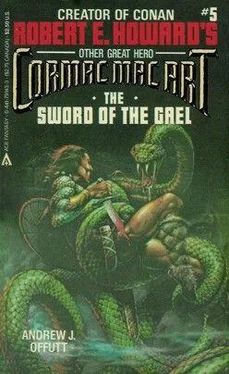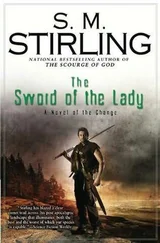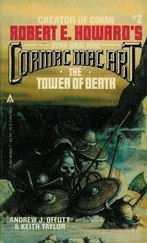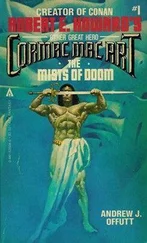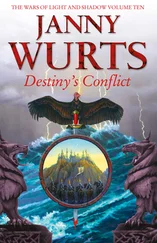Andrew Offutt - The Sword of the Gael
Здесь есть возможность читать онлайн «Andrew Offutt - The Sword of the Gael» весь текст электронной книги совершенно бесплатно (целиком полную версию без сокращений). В некоторых случаях можно слушать аудио, скачать через торрент в формате fb2 и присутствует краткое содержание. Жанр: Фэнтези, на английском языке. Описание произведения, (предисловие) а так же отзывы посетителей доступны на портале библиотеки ЛибКат.
- Название:The Sword of the Gael
- Автор:
- Жанр:
- Год:неизвестен
- ISBN:нет данных
- Рейтинг книги:3 / 5. Голосов: 1
-
Избранное:Добавить в избранное
- Отзывы:
-
Ваша оценка:
- 60
- 1
- 2
- 3
- 4
- 5
The Sword of the Gael: краткое содержание, описание и аннотация
Предлагаем к чтению аннотацию, описание, краткое содержание или предисловие (зависит от того, что написал сам автор книги «The Sword of the Gael»). Если вы не нашли необходимую информацию о книге — напишите в комментариях, мы постараемся отыскать её.
The Sword of the Gael — читать онлайн бесплатно полную книгу (весь текст) целиком
Ниже представлен текст книги, разбитый по страницам. Система сохранения места последней прочитанной страницы, позволяет с удобством читать онлайн бесплатно книгу «The Sword of the Gael», без необходимости каждый раз заново искать на чём Вы остановились. Поставьте закладку, и сможете в любой момент перейти на страницу, на которой закончили чтение.
Интервал:
Закладка:
Andrew J Offutt
The Sword of the Gael
Foreword
This novel is the result of a couple of love affairs.
To begin with, I have been a fan of the work of Robert E. Howard for a long time. I don’t expect to “outgrow” that, and Cormac son of Art of Connacht is a Howard character.
Next, while reading over a million words in research and taking thousands of words of notes, I fell hopelessly in love with the Emerald Isle, whether it be called Eirrin or Erin or Eire or Ireland. That me grandmither was an O’Driscoll has nothing to do with it-I think. Nor even-I think-that I once married a woman whose name strings out as Mary Josephine McCarney McCabe Offutt. Or maybe that’s O’ffutt…
It is astonishing how little we know of history or “history,” other than Roman, before AD 800 or so. Open your encyclopedia to Scotland or Ireland or any part of Britain and see when they seem to think history began. Even at that I was unable to get hold of all the material I needed (whether I knew of its existence or not), and shall as a consequence probably catch it from some of the Eirrin-born.
Consider this: Stirrups had not been invented at the time of this novel (about AD 490). Stirrups made possible chivalry (from cheval , horse) and knighthood, for they made possible combat on horseback. Try sitting even a standing horse without stirrups, and swinging your arms strenuously. Revelation can be painful, even without a heavy sword or ax, in hand, much less while weighted with helmet, armor, and buckler!
Some will note that the history shown here is accurate-but that the history books show different royal names in the late fifth century. This is fiction , and I wanted people such as Prince Ceann to exist, and Samaire, and Feredach the Dark. Also… Howard held ever an awareness or belief in continuity , both in the history of this planet and among races and nations. Does racial memory exist? Howard thought so. It is obvious from his work that he carried the same awareness/belief as regards individuals .
But I think that belongs in an article I will probably write, some day. Meanwhile: Things are not always as they seem, even when we have “historical records.” (Tell me about a contemporary-?-of Cormac, King Arthur, and then go look him up. The Mayaguez incident of modern piracy is history, and we can lay it all out neatly from start to finish-or can we?)
Finally there is this.
I have avowed being a fan of Robert E. Howard; we even collect Conan comics at my house. I am extremely, often painfully, aware of REH’s shortcomings, too. I studied Howard before I wrote this book, and while I wrote it, too. His Cormac stories I read four times over before I even began to write, and I made notes. (Don’t tell me Howard said Cormac had been in exile fifteen years or more, while I say twelve. It was twelve. Maybe Cormac dissembled to Howard as he did to Wulfhere, hating to be so young-while so bright and competent.)
Nevertheless, I have not attempted to copy Howard. Where is the worthiness in that?
Howard was like Burroughs in that people can and do make themselves feel superior by making fun of his cardboard characters and purple prose. (Building oneself up by tearing others down is a favorite game-because it is so easy.) Yet, like that of Burroughs, Howard’s work lives and has grown increasingly more popular. Simply put, REH, like ERB, had the Magic. Whether we are fans or imitators-there are lots of those-or emulators or choke-gasp critics, we all sort of wish we had that Magic, too. If I’ve got hold of some of it, wonderful! You can pat my back if you’re of a mind to and my hand will be right there with yours.
In addition, though, I was completely charmed by the language of Augusta Gregory’s 1892 translation of the great Irish folk-cycle, Cuchulain of Muirthemne (see Pronunciation Guide ). I copy no one, consciously. Let’s say though that I have been ever conscious and most mindful of both Howard’s style and of Lady Gregory’s “Old Gaelic” way of telling Cuchulain’s story, while I told Cormac’s.
That’s enough. All I started off to do was tell you about the lack of stirrups, and what a great joy and sheer fun this has been for me, and to assure you that all I have done here is with love of Howard’s work and what little I know of old Eirrin.
Maybe the publisher will let me write another Cormac story. It’s fun.
andrew j offutt
Kentucky, U.S.A.
April, 1975
Chapter One: The Wrath of Manannan MacLir
Patrick, enquire of God
Whether he recollects when Cormac was alive;
Or hath he seen, East or West
A man his equal, in time of fight.
– from “Cormac the Gael,”
by Ceann Ruadh, the “Minstrel-king”
“I pray that we reach the land of Eirrin, those who are riding upon the great, productive, vast sea:
That they be distributed upon her plains, her mountains, and her valleys; upon her forests that shed showers of nuts and all fruits; upon her rivers and her cataracts; upon her lakes and her great writers; upon her spring-abounding hills:
That they may hold their fairs and equestrian sports upon her territories:
That there may be a king from them in Tara; and that Tara be the territory of their many kings:
That noble Eirrin be the home of the ships and boats of the sons of Milesius:
Eirrin that is now in darkness, it is for her this oration is pronounced:
Let the learned wives of Breas and Buaigne pray that we may reach the noble woman, great Eirrin.
Let Eremon pray, and let Ir and Eber implore, that we may reach Eirrin.”
– Prayer of the poet Amergin for the coming of the Celts to Eire
Like a demon from the darkest Plutonian hell of the fallen Romans, the wind shrieked and howled in its sudden attack.
It was a vicious wild thing bent on the destruction of sailcloth and timber and human flesh, and men of the Wolfsail went hurtling from the frail vessel to their deaths. Their screams were unheard above that of the slashing wind.
The deckless little ship spun and careened. Its single mast was cracked and had fallen, to carry with it two good men amid striped squaresail of Nordic weave. Down went Wolfsail’s starboard, till she lay flat with her port side to the darkling sun. Her keel rose like a low wall from the brine. In that sudden sideward lunge more men met their weirds with wails of horror and black death.
The hugest of those desperate seafarers held fast the jagged stump of the ruined mast. To his great broad swordbelt clung one of his men; to his knotty calf in its soaked leggings hung another, fearful of being swept off the ridge of the world. The huge man gripped the mast as though it was his beloved. He it was who bellowed out to Father Odin and his son The Thunderer, for they had escaped the dread whirlpool off these nameless little isles of unpredictable elements only to fall prey to this demon-shrieking gale.
One-eyed Odin and his son heard not-or if they did, were steadfast in their resolve to punish their sometime servant for his many sins. Nor durst he relinquish his grip even so long as to draw steel, that he might die as befit his people, with sword in ruddy fist.
The little ship spun, swung, tipped, and spun again. It hurtled headlong. Islands flew by, shod and crowned with jagged rock. Cordage creaked and wood groaned as if in mortal agony. Men moaned, or prayed, or shouted-or screamed and went to their fathers.
One among their number was silent, and him alone.
Читать дальшеИнтервал:
Закладка:
Похожие книги на «The Sword of the Gael»
Представляем Вашему вниманию похожие книги на «The Sword of the Gael» списком для выбора. Мы отобрали схожую по названию и смыслу литературу в надежде предоставить читателям больше вариантов отыскать новые, интересные, ещё непрочитанные произведения.
Обсуждение, отзывы о книге «The Sword of the Gael» и просто собственные мнения читателей. Оставьте ваши комментарии, напишите, что Вы думаете о произведении, его смысле или главных героях. Укажите что конкретно понравилось, а что нет, и почему Вы так считаете.
